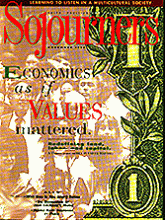One of the great discoveries of my adult life has been that the Bible does include me, that while Victorian hymns may intone, "rise up ye men of God," or, "sons of men and angels sing," the Bible addresses both the men and the women of God. I'm thrilled that new and more accurate translations of the Bible (such as the New Revised Standard Version and the forthcoming New International Version) are using inclusive language while remaining faithful to the text.
Many people have a well-earned suspicion of those who want to use language in a way that excludes women. Years of research has shown many instances of texts being subverted by the biases of translators. A word that is translated "quietly" when describing how men ought to work is translated "in silence" when it describes how women are to worship. A word that is translated "minister" when describing a male church leader is translated "helper" when it describes a female church leader. Language has long been used to keep women in their place.
In this light, a recent cover article in the evangelical magazine Christianity Today brought some surprise and regret. The article, titled "Why God Is Not Mother," was an argument against inclusive language that focused particularly on feminine references to God. According to the author, Elizabeth Achtemeier, "The Bible's language for God is masculine, a unique revelation of God in the world."
Read the Full Article

